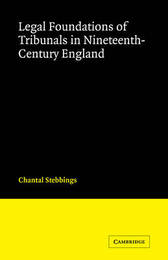
|
Legal Foundations of Tribunals in Nineteenth Century England
Paperback / softback
Main Details
| Title |
Legal Foundations of Tribunals in Nineteenth Century England
|
| Authors and Contributors |
By (author) Chantal Stebbings
|
| Series | Cambridge Studies in English Legal History |
|---|
| Physical Properties |
| Format:Paperback / softback | | Pages:380 | | Dimensions(mm): Height 216,Width 140 |
|
| ISBN/Barcode |
9780521107518
|
| Classifications | Dewey:347.42009034 |
|---|
| Audience | | Professional & Vocational | |
|---|
|
Publishing Details |
| Publisher |
Cambridge University Press
|
| Imprint |
Cambridge University Press
|
| Publication Date |
2 April 2009 |
| Publication Country |
United Kingdom
|
Description
Nineteenth-century governments faced considerable challenges from the rapid, novel and profound changes in social and economic conditions resulting from the industrial revolution. In the context of an increasingly sophisticated and complex government, from the 1830s the specialist and largely lay statutory tribunal was conceived and adopted as the principal method of both implementing the new regulatory legislation and resolving disputes. The tribunal's legal nature and procedures, and its place in the machinery of justice, were debated and refined throughout the Victorian period. In examining this process, this 2007 book explains the interaction between legal constraints, social and economic demand and political expediency that gave rise to this form of dispute resolution. It reveals the imagination and creativity of the legislators who drew on diverse legal institutions and values to create the new tribunals, and shows how the modern difficulties of legal classification were largely the result of the institution's nineteenth-century development.
Author Biography
Chantal Stebbings is Professor of Law and Legal History in the University of Exeter. Her research is in the commercial legal history of the nineteenth century, with special reference to the law of taxation, trusts, and commercial property.
Reviews"This book is almost encyclopaedic in its coverage, and contains a great fund of information on these bodies which will be of great use to future scholars. It also includes a particularly useful chapter on the relationship between the tribunals and the superior courts, showing how the courts developed and exercised a power of judicial review of errors of law in the tribunals. It promises to be an essential reference point for future historians working on nineteenth century tribunals." --Michael Lobban, University of London: Law and History Review
|